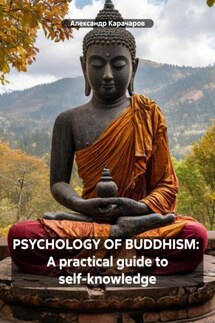PSYCHOLOGY OF BUDDHISM: A practical guide to self-knowledge - страница 4
Buddhist psychology is not just a theory, it is a practical guide to life that can help us find inner harmony, overcome suffering, and reach our potential. It is a journey to yourself, to understanding the deep workings of your mind, and to discovering the source of true happiness that is always within us. I invite you to this fascinating journey, where ancient wisdom meets modern needs, and where everyone can find a way to a more conscious, happy and fulfilling life.
Chapter 1. Buddhist psychology (Tib. blo rigs)
Why study the mind?
Like a traveler lost in a thick forest, we often wander in the labyrinths of our own mind, not understanding its nature and power. But why should we embark on this journey within ourselves, into this mysterious world of thoughts and feelings? Imagine a wise helmsman, confidently leading a ship through turbulent waves. In the same way, our mind is the steering wheel of our life. Our every word, every action, every thought – all this is subject to his commands. Whether it is joy that illuminates our path or sadness that darkens our horizon, it is the mind that colors our experiences and determines our reaction to the world.
The ancient wisdom imprinted in the Buddhist canon "Dhammapada", like an echo of centuries, conveys the truth to us:
"The mind is the master, the mind is the creator, all thoughts are its children. If anyone speaks and acts with an evil mind, Suffering follows him like a wheel follows the hoof of an ox. The mind is the master, the mind is the creator, all thoughts are its children. If anyone speaks and acts with a pure mind, Happiness follows him like a shadow, relentlessly."
This metaphor, like a vivid picture, draws before us the connection between our thoughts and our fate. Imagine an ox-drawn cart. Wherever the ox goes, the cart follows him relentlessly. In the same way, our sufferings or joys are inextricably linked with the quality of our thoughts.
The great Buddhist scholar Acharya Vasubandhu, like a skilled jeweler, reveals the mystery of the universe in his work "Abhidharmakosa", saying that all the diversity of our world arises from our actions, and actions, in turn, are generated by intentions. Intention is an internal command, a mental impulse that sets in motion a chain of our actions.
"From deeds is born the diversity of worlds. This is the intention created by him. Intention is a mental act, and bodily and verbal acts are performed by it."
In the hustle and bustle of modern life, we often see how a person obsessed with the pursuit of material goods experiences only anxiety and dissatisfaction. His mind, like an insatiable beast, constantly demands more, generating thoughts of lack and fear. And, as a result, he reaps the fruits of stress and unhappiness. The other, who devotes himself to helping others, experiences a deep sense of satisfaction and joy. His mind, like fertile soil, cultivates compassion and the desire to do good.
Acharya Chandrakirti, like a wise seer, goes even deeper in his Madhyamaka-avatara, asserting that our very consciousness creates both the world of sentient beings and the world around us.
"Consciousness creates very diverse Worlds of living beings and Worlds of vessels. It is said that all beings are born through action – karma. Having rejected consciousness, we have no action – karma."






